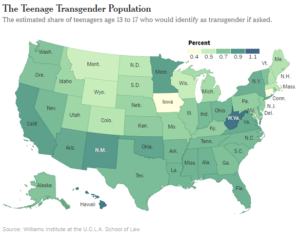Moises Velasquez-Manoff / March 4, 2017
After the nation’s first black president, we now have a white president with the whitest and malest cabinet since Ronald Reagan’s. His administration immediately made it a priority to deport undocumented immigrants and to deny people from certain Muslim-majority nations entry into the United States, decisions that caused tremendous blowback.
What President Trump doesn’t seem to have considered is that diversity doesn’t just sound nice, it has tangible value. Social scientists find that homogeneous groups like his cabinet can be less creative and insightful than diverse ones. They are more prone to groupthink and less likely to question faulty assumptions.
What’s true of groups is also true for individuals. A small but growing body of research suggests that multiracial people are more open-minded and creative. Here, it’s worth remembering that Barack Obama, son of a Kenyan father and a white Kansan mother, wasn’t only the nation’s first black president, he was also its first biracial president. His multitudinous self was, I like to think, part of what made him great — part of what inspired him when he proclaimed that there wasn’t a red or blue America, but a United States of America.
As a multiethnic person myself — the son of a Jewish dad of Eastern European descent and a Puerto Rican mom — I can attest that being mixed makes it harder to fall back on the tribal identities that have guided so much of human history, and that are now resurgent. Your background pushes you to construct a worldview that transcends the tribal.
You’re also accustomed to the idea of having several selves, and of trying to forge them into something whole. That task of self-creation isn’t unique to biracial people; it’s a defining experience of modernity. Once the old stories about God and tribe — the framing that historically gave our lives context — become inadequate, on what do we base our identities? How do we give our lives meaning and purpose?
President Trump has answered this challenge by reaching backward — vowing to wall off America and invoking a whiter, more homogeneous country. This approach is likely to fail for the simple reason that much of the strength and creativity of America, and modernity generally, stems from diversity. And the answers to a host of problems we face may lie in more mixing, not less.
Consider this: By 3 months of age, biracial infants recognize faces more quickly than their monoracial peers, suggesting that their facial perception abilities are more developed. Kristin Pauker, a psychologist at the University of Hawaii at Manoa and one of the researchers who performed this study, likens this flexibility to bilingualism.
Early on, infants who hear only Japanese, say, will lose the ability to distinguish L’s from R’s. But if they also hear English, they’ll continue to hear the sounds as separate. So it is with recognizing faces, Dr. Pauker says. Kids naturally learn to recognize kin from non-kin, in-group from out-group. But because they’re exposed to more human variation, the in-group for multiracial children seems to be larger.
This may pay off in important ways later. In a 2015 study, Sarah Gaither, an assistant professor at Duke, found that when she reminded multiracial participants of their mixed heritage, they scored higher in a series of word association games and other tests that measure creative problem solving. When she reminded monoracial people about their heritage, however, their performance didn’t improve. Somehow, having multiple selves enhanced mental flexibility.
But here’s where it gets interesting: When Dr. Gaither reminded participants of a single racial background that they, too, had multiple selves, by asking about their various identities in life, their scores also improved. “For biracial people, these racial identities are very salient,” she told me. “That said, we all have multiple social identities.” And focusing on these identities seems to impart mental flexibility irrespective of race.
It may be possible to deliberately cultivate this kind of limber mind-set by, for example, living abroad. Various studies find that business people who live in other countries are more successful than those who stay put; that artists who’ve lived abroad create more valuable art; that scientists working abroad produce studies that are more highly cited. Living in another culture exercises the mind, researchers reason, forcing one to think more deeply about the world.
Another path to intellectual rigor is to gather a diverse group of people together and have them attack problems, which is arguably exactly what the American experiment is. In mock trials, the Tufts University researcher Samuel Sommers has found, racially diverse juries appraise evidence more accurately than all-white juries, which translates to more lenient treatment of minority defendants. That’s not because minority jurors are biased in favor of minority defendants, but because whites on mixed juries more carefully consider the evidence.
The point is that diversity — of one’s own makeup, one’s experience, of groups of people solving problems, of cities and nations — is linked to economic prosperity, greater scientific prowess and a fairer judicial process. If human groups represent a series of brains networked together, the more dissimilar these brains are in terms of life experience, the better the “hivemind” may be at thinking around any given problem.
The opposite is true of those who employ essentialist thinking — in particular, it seems, people who espouse stereotypes about racial groups. Harvard and Tel Aviv University scientists ran experiments on white Americans, Israelis and Asian-Americans in which they had some subjects read essays that made an essentialist argument about race, and then asked them to solve word-association games and other puzzles. Those who were primed with racial stereotypes performed worse than those who weren’t. “An essentialist mind-set is indeed hazardous for creativity,” the authors note.
None of which bodes well for Mr. Trump’s mostly white, mostly male, extremely wealthy cabinet. Indeed, it’s tempting to speculate that the administration’s problems so far, including its clumsy rollout of a travel ban that was mostly blocked by the courts, stem in part from its homogeneity and insularity. Better decisions might emerge from a more diverse set of minds.
And yet, if multiculturalism is so grand, why was Mr. Trump so successful in running on a platform that rejected it? What explains the current “whitelash,” as the commentator Van Jones called it? Sure, many Trump supporters have legitimate economic concerns separate from worries about race or immigration. But what of the white nationalism that his campaign seems to have unleashed? Eight years of a black president didn’t assuage those minds, but instead inflamed them. Diversity didn’t make its own case very well.
One answer to this conundrum comes from Dr. Sommers and his Tufts colleague Michael Norton. In a 2011 survey, they found that as whites reported decreases in perceived anti-black bias, they also reported increasing anti-white bias, which they described as a bigger problem. Dr. Sommers and Dr. Norton concluded that whites saw race relations as a zero-sum game. Minorities’ gain was their loss.
In reality, cities and countries that are more diverse are more prosperous than homogeneous ones, and that often means higher wages for native-born citizens. Yet the perception that out-groups gain at in-groups’ expense persists. And that view seems to be reflexive. Merely reminding whites that the Census Bureau has said the United States will be a “majority minority” country by 2042, as one Northwestern University experiment showed, increased their anti-minority bias and their preference for being around other whites. In another experiment, the reminder made whites more politically conservative as well.
It’s hard to know what to do about this except to acknowledge that diversity isn’t easy. It’s uncomfortable. It can make people feel threatened. “We promote diversity. We believe in diversity. But diversity is hard,” Sophie Trawalter, a psychologist at the University of Virginia, told me.
That very difficulty, though, may be why diversity is so good for us. “The pain associated with diversity can be thought of as the pain of exercise,” Katherine Phillips, a senior vice dean at Columbia Business School, writes. “You have to push yourself to grow your muscles.”
Closer, more meaningful contact with those of other races may help assuage the underlying anxiety. Some years back, Dr. Gaither of Duke ran an intriguing study in which incoming white college students were paired with either same-race or different-race roommates. After four months, roommates who lived with different races had a more diverse group of friends and considered diversity more important, compared with those with same-race roommates. After six months, they were less anxious and more pleasant in interracial interactions. (It was the Republican-Democrat pairings that proved problematic, Dr. Gaither told me. Apparently they couldn’t stand each other.)
Some corners of the world seem to naturally foster this mellower view of race — particularly Hawaii, Mr. Obama’s home state. Dr. Pauker has found that by age 7, children in Massachusetts begin to stereotype about racial out-groups, whereas children in Hawaii do not. She’s not sure why, but she suspects that the state’s unique racial makeup is important. Whites are a minority in Hawaii, and the state has the largest share of multiracial people in the country, at almost a quarter of its population.
Constant exposure to people who see race as a fluid concept — who define themselves as Asian, Hawaiian, black or white interchangeably — makes rigid thinking about race harder to maintain, she speculates. And that flexibility rubs off. In a forthcoming study, Dr. Pauker finds that white college students who move from the mainland to Hawaii begin to think differently about race. Faced daily with evidence of a complex reality, their ideas about who’s in and who’s out, and what belonging to any group really means, relax.
Clearly, people can cling to racist views even when exposed to mountains of evidence contradicting those views. But an optimistic interpretation of Dr. Pauker’s research is that when a society’s racial makeup moves beyond a certain threshold — when whites stop being the majority, for example, and a large percentage of the population is mixed — racial stereotyping becomes harder to do.
Whitelash notwithstanding, we’re moving in that direction. More nonwhite babies are already born than white. And if multiracial people work like a vaccine against the tribalist tendencies roused by Mr. Trump, the country may be gaining immunity. Multiracials make up an estimated 7 percent of Americans, according to the Pew Research Center, and they’re predicted to grow to 20 percent by 2050.
President Trump campaigned on a narrow vision of America as a nation-state, not as a state of people from many nations. His response to the modern question — How do we form our identities? — is to grasp for a semi-mythical past that excludes large segments of modern America. If we believe the science on diversity, his approach to problem solving is likely suboptimal.
Many see his election as apocalyptic. And sure, President Trump could break our democracy, wreck the country and ruin the planet. But his presidency also has the feel of a last stand — grim, fearful and obsessed with imminent decline. In retrospect, we may view Mr. Trump as part of the agony of metamorphosis.
And we’ll see Mr. Obama as the first president of the thriving multiracial nation that’s emerging.
—————-
Moises Velasquez-Manoff, the author of “An Epidemic of Absence: A New Way of Understanding Allergies and Autoimmune Disease,” is a contributing opinion writer.
A version of this op-ed appears in print on March 5, 2017, on Page SR1 of the New York edition with the headline: What Biracial People Know.
In: nytimes








